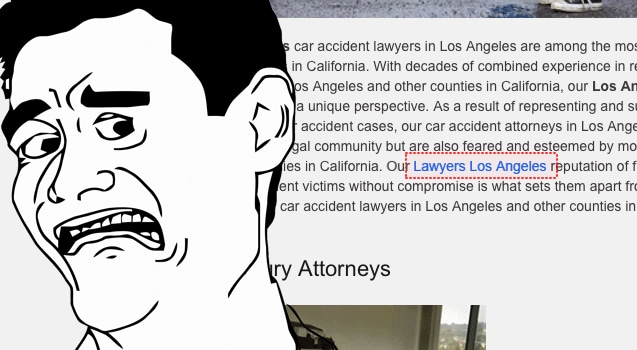
I work with business owners on their link building efforts and overall SEO strategy on a daily basis. From what I’ve seen, this topic is one of the most misunderstood and debated aspects of SEO: choosing anchors that have the most SEO impact.
I often get asked the question “Which keywords will you be targeting?” and “How many keywords can we target”; this is one of the last things that should be on your mind when it comes to link building. I’ll do my best to answer these questions in my blog post, as well as debunk the “over-optimized anchor text” myth and explain why these links can actually do more harm than good.
The Anchor Text Myth
For most of our clients, we see that the average understanding of anchor text and link building is that if a link doesn’t have your main keyword in the anchor, it is useless. Not true! Here are a couple examples of an anchor text one might choose to link to their cheap handbag website within an article (both a good example and a bad example):
Good Example:
- … and from what we’ve seen, there are numerous websites that offer this type of wholesale pricing as a result of warehouse discounts and …
Bad Example
- … and would be a great starting point for anyone looking to Buy Cheap Handbags online…
Now, under the Good Example, one of the most common things I am told is “That anchor text doesn’t contain my keyword. We are not trying to rank for this term, and this link has little value to us”.
I’m here to tell you that not only is the first example much more effective and powerful than the second, but it is safer and will be much more effective in increasing your rankings for your main keyword, even though it doesn’t contain a “money” keyword. Here’s why.
Understanding Search Engines
Search engines are constantly fighting the battle that is webspam and SEOs. With websites that allow you to buy cheap backlinks, marketplaces like Fiverr where you can buy links from the thousands, and complex link wheel generation software, Google’s algorithm is now incredibly advanced to where they can detect this behavior from a mile away. One mistake that most people make is that they underestimate how advanced Google’s algorithm really is (it is updated hundreds of times per year; more than once a day on average!)
That being said, Google’s top concern when identifying a website’s new inbound links is this:
How natural does this link look?
Google is well aware of your primary keywords. They know what keywords you want to rank for; this is evident by your homepage, your keyword density, your meta tags, and the content you write about. The most common misconception is that, in order to increase your rankings for these main “money” keywords, you need to hammer them with as many anchor-text-saturated links as possible. However, this is the exact kind of behavior that Google sees millions of times on a daily basis, and their software is advanced enough to dramatically discount these links to the point where your link building efforts are pointless.
How Would You Link to a Website
Here’s a scenario: you’re writing an article about handbags, and you wanted to link to a website that sells cheap handbags. Take a look up at our Good Example and our Bad Example that we mentioned earlier; would you link to this website with the anchor text “Buy Cheap Handbags”? Probably not.
Google has already taken this into consideration when evaluating new inbound links.
If you have a large amount of over-saturated keyword anchors, Google will assume that they are probably not naturally-derived and that they were created by you. These over-saturated anchor links will likely be discounted significantly.
The bottom line: Google values links that appear to be naturally-derived, and having keyword-saturated anchor text does not look very natural at all. It is very possible to improve your rankings of your main keyword and build your authority by building links that actually add value to an article, without using keywords in your anchor text.


Thanks for the information I had no idea optimised anchor text is no longer necessary let alone actually be detrimental.
I’m glad you enjoyed my article. Absolute match anchor text is more often abused than used naturally within a webpage.
Thanks for really useful information and cleared my mind about Anchor Text for SEO.
I appreciate the kind words! Natural looking and relevant links are always best.